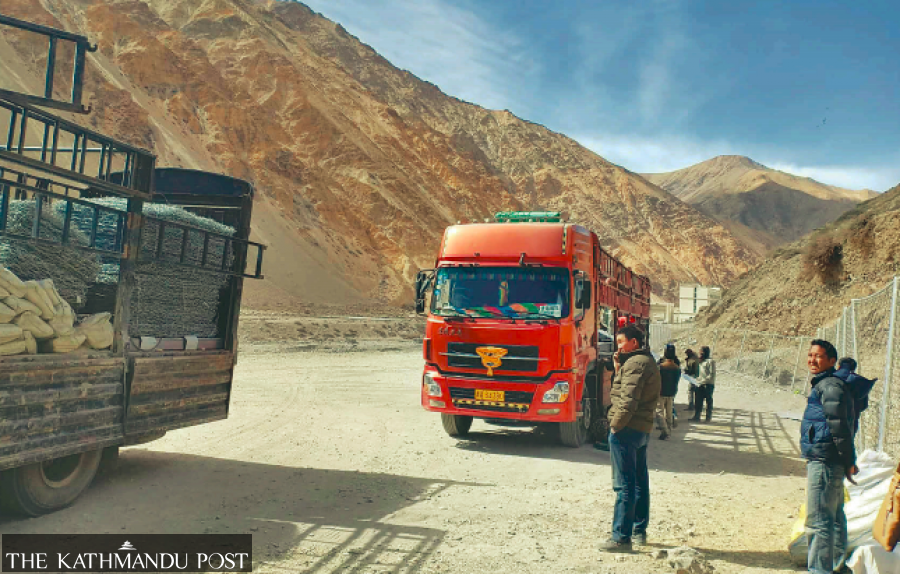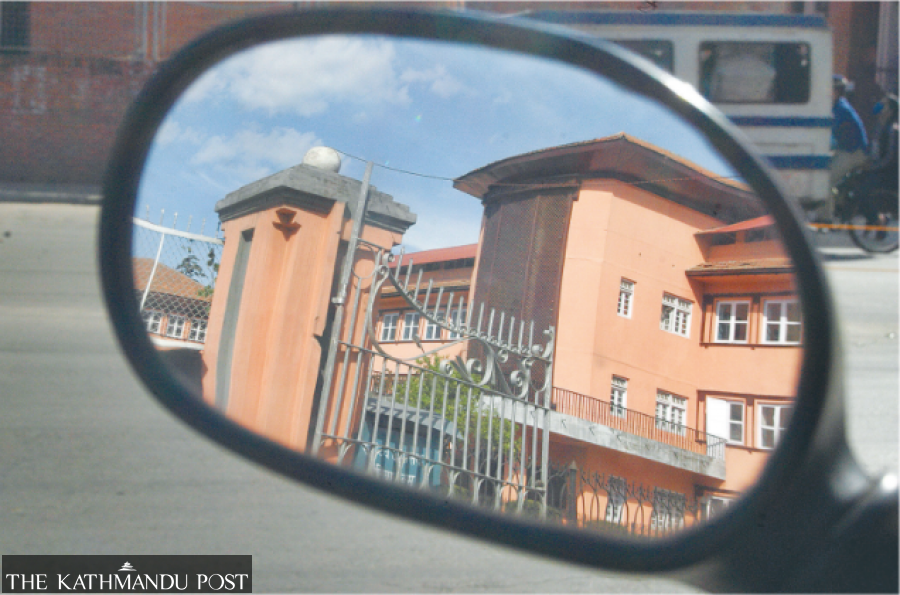When it comes to relations with neighbours, a studied approach that is above partisan interests is required, and both Oli and Deuba have bungled, analysts say.
When it comes to Nepal’s foreign policy issues, what is missing is—the Nepal government.
Over the years Nepal has seen governments of one political party or another, and these governments function based on the orientation of the party that is leading. And when foreign policy matters are concerned, the Nepali state is confused.
The border issue with China is a case in point.
Last year in September, reports surfaced that the Chinese side had built 11 buildings in a remote part of Humla district that Nepal claims as its own territory.
The Ministry of Foreign Affairs was quick to say that there were no disputes.
“The Department of Survey, based on official records, reports of the joint field inspection and boundary maps, has verified and confirmed that the said buildings are not located within the Nepali territory,” read the statement.
The government then was led by KP Sharma Oli, who now heads the CPN-UML.
Oli was replaced by Nepali Congress’ Sher Bahadur Deuba on July 13. Deuba is mainly backed by the Communist Party of Nepal (Maoist Centre), which until March this year was part of the Oli government.
On Wednesday, Deuba formed a five-member team to “study” the boundary dispute with China. The team is headed by a joint secretary at the Ministry of Home Affairs. Neither the name of the joint secretary nor the terms of reference have been finalised yet.
One of the ministers in the Deuba government said the panel was formed at the initiative of Deuba.
“But it was set up without the required debate and discussions on the issue,” said the minister who did not wish to be named.
The Deuba Cabinet has just four ministers.
Experts say Nepal has historically failed to make a clear position on foreign policy matters, especially when it comes to the neighbours, as such matters usually depend on the party in power. While the Oli government made a bungle, the Deuba government has not done any good with regards to the boundary issue with China, according to them.
“Pradeep Gyawali, who was foreign minister [when the boundary row surfaced] should not have dismissed the issue in haste when an elected member raised the issue pertaining to Namkha Rural Municipality,” said Toyanath Baral, former director general at the Department of Survey. “The then government should have dispatched a technical team or made public the report prepared by the chief district officer of Humla.”
Jeevan Bahadur Shahi, a member of the Karnali Provincial Assembly, after a field trip, had prepared a report, saying Pillar Nos. 9, 10, 11, 12, 5 (1), 6 (1), 7 (1) and 8 (1) were damaged in Humla district, which borders China.
Shahi had also claimed that Pillar No. 12 was replaced by the Chinese side, as a result a large swathe of Nepali land had slipped into the Chinese side.
Shahi’s report, however, was not owned by the government.
The Home Ministry instead formed a team under Chirinjivi Giri, chief district officer of Humla, to look into the matter and prepare a report.
The report was never made public.
“We forwarded the report to the Ministry of Foreign Affairs,” said a senior Home Ministry official familiar with the report. “We thought the Foreign Ministry would speak on the basis of that report, but it made a statement before the Giri-led team submitted it to the Home Ministry, which put everyone in a quandary.”
The official said he is not in a position to say whether the Deuba government has taken the report into consideration to form a new team.
Long before Giri submitted the report to the Home Ministry, the Ministry of Foreign Affairs said on September 23, “The boundary between Nepal and China was delineated and demarcated based on the Boundary Treaty and Boundary Protocols signed between the two countries. Nepal and China have always maintained close communication on border matters.”
The Post’s repeated attempts to speak to Gyawali, who was foreign minister then, went unanswered.
After the formation of the Deuba government, the ruling alliance, in which the Maoist Centre, the Janata Samajbadi Party and the CPN (Unified Socialist) are coalition partners, unveiled its common minimum programme. The Kalapani dispute with India was included in the programme. Some Congress leaders were quick to point out why the China border issue was not the government’s priority.
Deuba then assured his party members that he would form a team to “study” the matter.
The Congress leaders’ insistence that the China border issue should be the government priority stemmed from the fact that the Chinese embassy in Kathmandu had written, on November 13, to the party over Shahi’s report which was doing rounds in the media. The Congress had taken it as an affront, saying the embassy had breached the protocol in sending the letter to the party.
Observers say the problem lies with Nepal’s political parties, as they have a tendency to take different approaches when it comes to India and China. While the Oli government’s hurried statement dismissing there was any border issue with China was wrong, it is equally wrong on the part of the Deuba government to form a committee “to study” the matter in haste, according to them.
The issue has become an irritant within the ruling alliance as well.
The Maoist Centre, Deuba’s key coalition partner, believes that the border dispute with China appears to be the Congress party’s agenda, rather than a national issue.
“This issue [of forming the team] has drawn our serious attention. This is a sensitive matter but the Nepali Congress is treating it as an internal party issue,” said Narayan Kaji Shrestha, a Maoist Centre leader and former foreign minister. “We are saying that we should have a common foreign policy. This [China border] issue is only on the Nepali Congress’ agenda, not on the agenda of the current alliance.”
When the issue had surfaced in September last year, the UML and the Maoist Centre were one party–the Nepal Communist Party (NCP)–after their merger in May 2018. Their merger was largely engineered by China, and both were considered to have a leaning towards the north, in such a way that none wanted to antagonise Beijing.
The Foreign Ministry’s hasty statement dismissing any border dispute with the north is believed to have been issued to not irritate China.
Now with the Deuba government raising the issue, questions have arisen if Nepal has a consistent foreign policy or it is guided by political parties’ narrow and myopic interests.
The Deuba government is already caught in diplomatic trouble. While it is under pressure to deal with India with regards to an incident in Darchula in which a youth fell into Mahakali while crossing the river using a cable crossing, it has entangled itself into the border dispute with China.
Observers say Deuba, who has been struggling to expand his Cabinet and ensure governance, is staring at yet another major diplomatic test. He is under pressure to ratify the Millennium Challenge Corporation compact, a United States programme under which Nepal will receive $500 million in grants, through Parliament. Here also, he is not sure his coalition partner, the Maoist Centre, would support him.
Fatema Z Sumar, vice president of the Department of Compact Operations at the Millennium Challenge Corporation, is set to arrive in Nepal on September 9 to discuss the MCC.
Observers say Deuba’s diplomatic dilemmas are immense. And at such a time, they say it was a premature move to form a team to “study” the border dispute with China, despite the fact the previous government had said there were no issues.
Bipin Adhikari, an expert on constitutional matters and a member of a government task team on boundary matters, said that Nepal should not conduct its foreign policy in a haphazard way and that it should take an objective approach while dealing with issues related to India and China.
“If there was indeed a need to form a committee, it should have been done through a studied decision. Such decisions should be taken based on need rather than whims,” said Adhikari. “The erstwhile government should not have dismissed the issue in the past. We have to maintain coherence in our foreign policy. Foreign policy should not be guided by partisan interests.”
According to Adhikari, a country’s foreign policy should not be devised based on which party is in power.
“The foreign policy should be of the state… not of the parties. It should be coherent, consistent and participatory,” said Adhikari.
A CPN-UML leader said the Deuba government’s decision to constitute a team is flawed.
“The Oli government had already dismissed any dispute in the region. Such a move will destabilise our relations,” said Bishnu Rijal, deputy chief of the UML’s foreign affairs department. “Any government, irrespective of which party is leading, should follow a balanced foreign policy.”
Experts on boundary issues say that it is natural for neighbouring countries to have an issue or two regarding their borders and that such issues should be dealt with and resolved amicably. According to them, since neighbours cannot be changed, it is in the larger interest of everyone to sit down and talk and find a lasting solution when such issues emerge.
“As per a protocol we have signed with China, if we find any dispute or encroachment, we can deal with it through a joint committee,” said Baral, the former director general at the Department of Survey and a member of the government team formed to study the Kalapani dispute. “We have a permanent mechanism to deal with boundary related issues with China. I had personally met with Gyawali and advised him to dispatch a technical team to Humla before making Nepal’s position public when the issue had surfaced in September last year.”
Nepal and China had prepared a digital boundary map in 2005-6 but it could not be signed due to dispute over the height of Mt Everest and one missing pillar in Rasuwa, according to Baral.
“Since 1989 we have not signed any boundary protocol with China,” said Baral. “It seems that the Deuba government made the decision in a hurry. I don’t know whether the current government even examined the archives and other details before forming the panel.”


